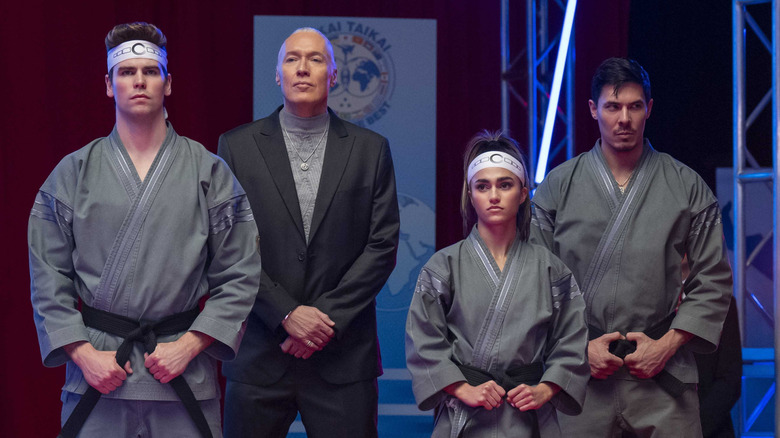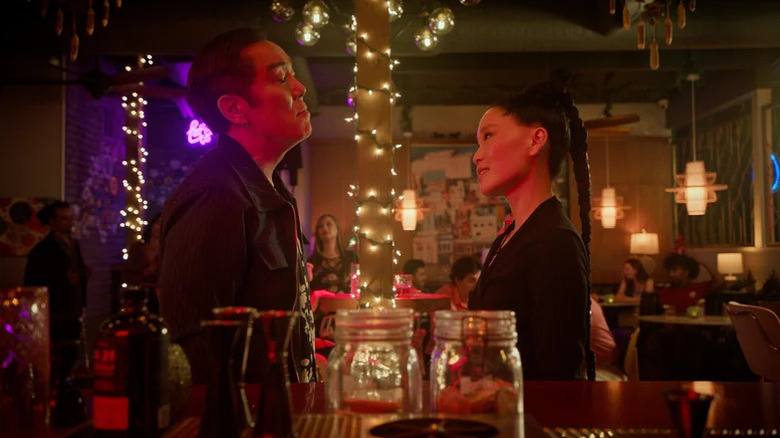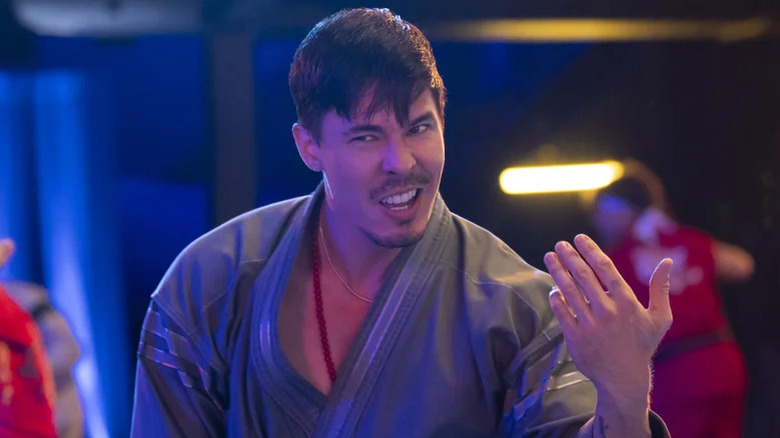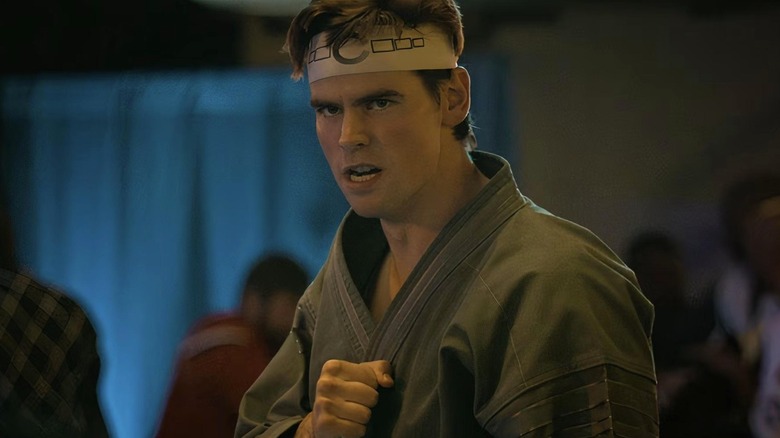The Two Cobra Kai Characters Who Literally Get Away With Murder
This article contains spoilers for "Cobra Kai" Season 6 Part 3.
"Cobra Kai" Season 6 Part 3 doesn't hesitate to give its main characters their just desserts. While the show sweeps several members of its extensive cast to the sidelines out of necessity, Daniel LaRusso (Ralph Macchio) and Johnny Lawrence's (William Zabka) inner circles get perfectly satisfactory happy endings, each tailor made for the character in question. Likewise, the franchise's two biggest overarching antagonists get a thematically appropriate send-off, as 1980s uber-villains John Kreese (Martin Kove) and Terry Silver (Thomas Ian Griffith) die in an explosive and extremely 1980s-coded yacht punch-up.
However, not everyone gets what they deserve. In fact, by the time the credits roll for the series finale, titled "Ex-Degenerate," two major characters quite literally get away with murder.
Desiring to gain control of the Korean branch of Cobra Kai, Kim Da-Eun (Alicia Hannah-Kim) kills her own grandfather Kim Sun-Yung (C. S. Lee) at the end of Episode 11, "Into the Fire." Likewise, Feng "Sensei Wolf" Xiao (Lewis Tan) is seen quite happily and deliberately using his Shaolin Sunset technique to kick a helpless opponent to death during a Bangkok cage fight in the "Cobra Kai" Season 6 Part 2 episode "Blood In Blood Out." Neither character faces any repercussions for their deadly actions, however, and in the grand scheme of things, both of them actually end the show with major wins under their belts.
Kim Da-Eun is steering Cobra Kai (and Chozen) toward a new direction
Despite the beginnings of a positive turn in "Cobra Kai" Season 6 Part 2, Kim Da-Eun spends the vast majority of her screen time functioning as a stone cold antagonist. In season 5, she heads a collection of senseis who maim and even attempt to kill major characters, and even after she decides to sever ties with Silver, she continues to remain loyal to the demonstrably villainous Kreese.
Sure, there are several mitigating factors to her actions, from the severity of her upbringing to the fact that Kreese, of all people, is the only person who showed her kindness during her formative years. Master Kim Sun-Yung also actively encourages murderous villain promotion methods when it comes to the leadership of their dojang — to the point of commending the form of the technique Da-Eun uses to kill him. The show even uses Da-Eun's budding relationship with Chozen Toguchi (Yuji Okumoto) to highlight her humanity.
Nevertheless, a murder is a murder. There's no denying that even though Da-Eun ends up killing her grandfather as a desperation measure after he's overwhelmed her in hand-to-hand combat, her original intention is to quietly stab the old man while he's sleeping. Take that into account, and it's a bit strange to see her rewarded with the complete control of the franchise's arguably most dangerous dojo ... not to mention the heavy implications of a romantic future with one of the show's most likable protagonists.
Despite tasting defeat, Sensei Wolf is back on top
Sensei Wolf's premeditated cage match slaying of a downed opponent takes place in a clearly illegal fight club, so it makes sense that he doesn't face legal repercussions. Still, even karma doesn't bite him as hard as it arguably should.
Wolf's speech to Johnny in the series finale proves that the Iron Dragons leader takes losing extremely seriously, and while he accepts his defeat somewhat gracefully, it's implied that being publicly defeated by a much older and less refined karate master will eat him for the rest of his days. His team is also far from its best at the show's end. Axel Kovačević (Patrick Luwis) has enough of his training methods and leaves the Iron Dragons, while Zara Malik (Rayna Vallandingham) loses her aura of invincibility in a decisive and brutal defeat by Tory Nichols (Peyton List).
Even so, at the end of the day Wolf gains far more than he loses. In the Bangkok flashback scene, he's a disgraced, debt-riddled man who's lost his dojo. After the series finale, he's back in control of the Iron Dragons and has a very respectable Sekai Taikai silver medal in his pocket after a mere one-point loss to hometown hero Johnny. What's more, it's likely that his money troubles are also a thing of the past. Even though Terry Silver isn't there to finance him anymore, karate is now more visible than ever, so an extremely presentable three-time Sekai Taikai winner like Wolf should have no trouble attracting the kind of lucrative sponsor deals Tory and Robby Keene (Tanner Buchanan) are offered. Considering how some of the far less lethal villains end their "Cobra Kai" arcs, the Iron Dragons sensei basically wins the lottery.
The implications of one Cobra Kai death are left unaddressed
Apart from the blood on Kim Da-Eun and Sensei Wolf's hands, there's another demise that the show doesn't fully explore: namely, Kwon's (Brandon H.Lee) death in the "Cobra Kai" Season 6 Part 2 finale, "Eunjangdo." While Season 6 Part 3 does show that the televised tragedy of Kwon accidentally falling on a blade during the all-out brawl causes the tournament to be halted and affects several characters deeply, we never really find out how Axel Kovačević (Patrick Luwis) deals with it.
Since Axel performed the block move that directly (though unwittingly) contributed to Kwon's death, it would be interesting to see how this impacted the Iron Dragons co-captain. Past seasons of "Cobra Kai" would likely have mined the tragedy for several episodes of trauma and character development — but since Axel is a relatively minor figure with just a few non-fighting scenes to his name, all we get is a few conflicted looks that might as well be caused by his increasing discomfort with Sensei Wolf's unethical practices.
While Axel isn't truly at fault in Kwon's accidental death, the fact that his reaction to the death isn't explored at all seems like a strange narrative decision, to say the least. Combined this with the two actual killers running free by the time the show ends, and it seems that "Cobra Kai" Season 6 has a nasty habit of glossing over violent fatalities — at least when it comes to their effects on the perpetrators.
"Cobra Kai" is now streaming in its entirety on Netflix.



